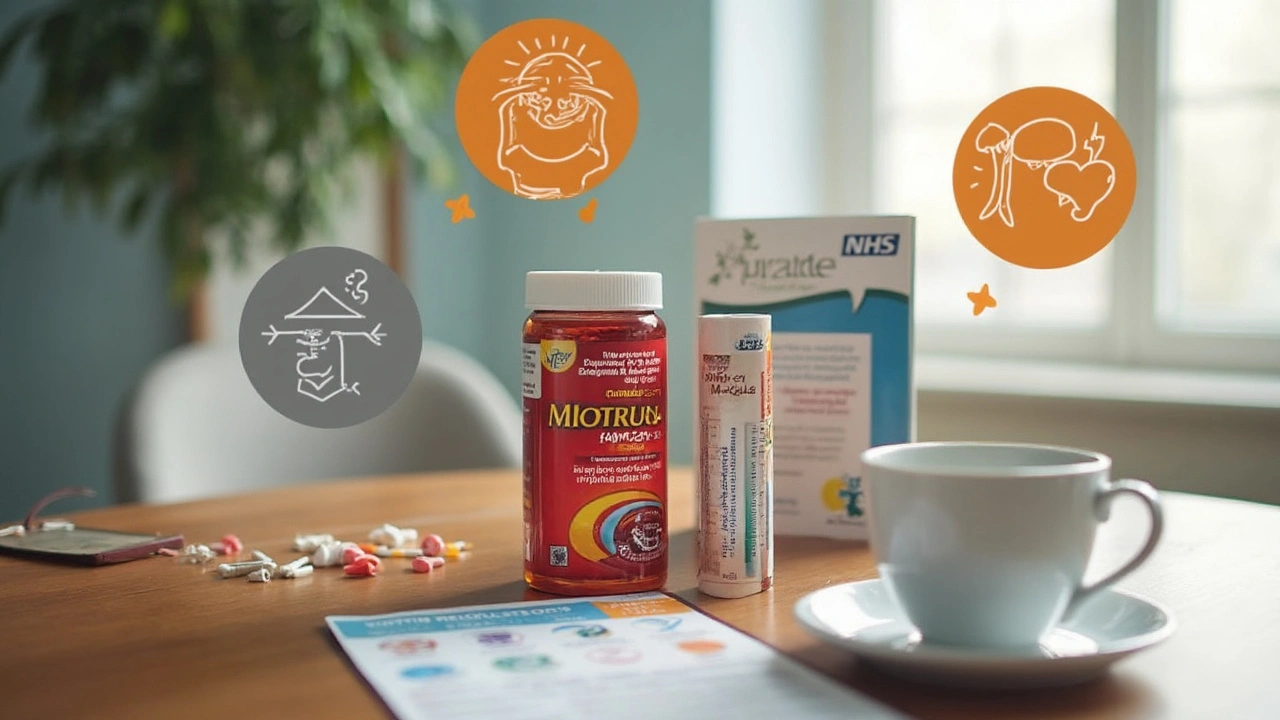Pop quiz: What do headaches, back pain, and a throbbing sprained ankle all have in common? They make life miserable—and that’s usually when most folks reach for Motrin. But before you tear through your medicine cabinet or give your kid a chewable version, there’s more to Motrin than just popping a pill and hoping for the best. If you’ve ever wondered why some ibuprofen bottles are labeled Motrin, what risks you might be ignoring, or how much you can really take, you’re about to get the answers you never got on those tiny drugstore pamphlets.
What is Motrin and How Does It Work?
Most people know Motrin as a go-to painkiller, but let’s get specific. Motrin is just a brand name for ibuprofen, which has been a household staple since the 1970s. It belongs to a class of medications called NSAIDs—nonsteroidal anti-inflammatory drugs. The idea behind NSAIDs is pretty straightforward: they target the body’s natural chemicals that cause swelling and pain, like prostaglandins. Prostaglandins aren’t the villains you might think—they actually help protect your stomach lining and support kidney function. But they also create pain and fever, so blocking them with Motrin gets rid of that misery fast.
Dive a little deeper, and here’s what really happens: Motrin blocks an enzyme called COX (cyclooxygenase). Your body has two key versions: COX-1 and COX-2. By stopping these enzymes, Motrin keeps prostaglandins low, so inflammation goes down, fever drops, and that ache starts to vanish. The relief usually comes in less than an hour and can stick around for up to 6–8 hours, which is pretty handy.
One interesting fact? Motrin was originally prescription-only when it hit the U.S. market in 1974. By the 1980s, it became available over the counter, right up there with Tylenol and aspirin. Unlike Tylenol (acetaminophen), though, Motrin not only soothes pain and fever but tackles swelling too, which makes it a favorite for sports injuries and arthritis.
When it comes to options, Motrin hasn’t held back. You’ll find it in liquids for kids, chewables, extra-strength caplets, gelcaps—even combos with other meds for nighttime relief. Every version works by targeting those prostaglandins, so whether it’s menstrual cramps or a post-gym disaster, Motrin has your back.
If you’re a trivia fan: Ibuprofen (aka Motrin) was originally derived from propionic acid, and the scientist who invented it, Stewart Adams, tested the first batch on himself after a hangover. Way to take one for the team, right?
The World Health Organization calls ibuprofen one of its “Essential Medicines”—meaning it's considered vital for basic health care. With that what-everyone-needs stamp of approval, you can see why Motrin is grabbed during everything from flu season to injury recovery.
Common Uses: When Motrin Makes Sense
Let’s get into the nitty-gritty—when should you actually reach for Motrin? Headache, joint pain, muscle aches—these are the classics. But Motrin is also super useful if you’re dealing with fevers, dental pain, menstrual cramps, or swelling from a sprain or strain. A lot of parents swear by Motrin for knocking down a child’s fever when a regular cold gets nasty, while adults often lean on it after surgery or to get through a tough workout hangover.
Motrin is often doctor-recommended for conditions like:
- Osteoarthritis and rheumatoid arthritis
- Tendonitis or bursitis
- Backache and neck pain
- Migraines
- Minor injuries like sprains, strains, and bruises
- Menstrual cramps (ibuprofen beats acetaminophen for many people here)
One important tip: While Motrin can work wonders for lots of aches, it’s not right for every type of pain. Stomachache from a virus? Stick to fluids. Heart surgery recovery? Doctors recommend skipping all NSAIDs like Motrin due to possible clotting risks. And kidney or liver issues? Always check with a doc before using Motrin—your kidneys process the drug, and too much can overload them, especially if you’re older or take other meds.
Now about dosing. The magic number for most adults is 200–400 mg every 4–6 hours, but don’t blow past 1200 mg a day if you’re just buying Motrin from a shelf. Doctors might go higher, up to 3200 mg, but usually for short-term flare-ups and under supervision. Kids’ doses depend on their weight, not age, so always double-check the package or ask a pharmacist if you’re unsure. Trust me, I asked Harper once when our kid came down with a stubborn fever—and the pharmacist probably saved us from a dosing headache.
Another headline fact: Unlike aspirin, Motrin doesn’t thin your blood much, so it’s safer for minor cuts or when your doctor says avoid blood thinners. But mixing Motrin with prescription blood thinners is a no-go unless your healthcare provider is directing it.
Got a runny nose and not sure if you can take Motrin with that allergy pill? Most decongestants and antihistamines play nicely with Motrin. The bigger risks come mixing Motrin with other NSAIDs, alcohol, or certain antidepressants—so stick with one NSAID, avoid heavy drinking, and talk to your doc about any other meds you’re on.

Risks, Side Effects, and How to Stay Safe
Swallowing a Motrin isn’t risky for most people, but ignoring potential side effects isn’t smart, either. The most common troublemaker is stomach upset—think heartburn, nausea, or even ulcers if you take Motrin on an empty stomach. Rarely, you can get bleeding in your stomach or intestines, which sounds scary because it is. That’s why you should always have Motrin with food or milk, and avoid long-term use without a doctor’s sign-off.
Other possible side effects include dizziness, headaches (ironically), high blood pressure, or swollen ankles. I have a buddy who once noticed ankle swelling after a week of Motrin following knee surgery—turned out it was the NSAID messing with his kidneys, something that can sneak up if you’re dehydrated or older than 60.
People with allergies to aspirin or other NSAIDs can react to Motrin with hives, wheezing, or even dangerous stuff like swelling of the face or throat. That means if you’ve had trouble with Advil, Aleve, or aspirin, steer clear of Motrin, too.
Long-term use of Motrin—think daily for months—raises risks for kidney problems, stomach ulcers, and even heart attacks, especially in people with pre-existing risk factors. The FDA added a warning back in 2015 about increased heart attack and stroke risk, even when you don’t have heart disease. So as tempting as it is to treat Motrin like candy, use it only when you need it, and don’t make it a daily habit without a medical reason.
According to Dr. Mark Fendrick, an internal medicine specialist,
"NSAIDs like ibuprofen can be very safe—if people follow the directions, don’t exceed the daily limits, and avoid mixing with other NSAIDs or blood thinners unless told by their doctor."
If you have asthma, you might get wheezy from Motrin—one in ten asthmatics can react. Pregnant? Only use Motrin in the first 20 weeks if your doctor says it’s ok, and skip it entirely in the third trimester because it can cause serious pregnancy complications. Breastfeeding? Small amounts show up in milk, but doctors usually consider Motrin safe for nursing moms.
What’s the smart way to take Motrin? Here are a few practical tips that have helped my own family:
- Always eat something before taking Motrin.
- Stick to the lowest dose that works, and only as long as symptoms last.
- Stay hydrated, especially if you’re older or taking Motrin more than a couple times a week.
- Check all your medications to make sure you’re not doubling up on NSAIDs.
- If you’re reaching for Motrin more than a few times a week for chronic pain, have your doctor check what’s going on—you might need a different treatment plan.
It’s wild how small changes can make a big difference. Harper once tried switching from daily Motrin for neck pain to physical therapy and managed to cut back pain meds by half within a couple weeks. Sometimes, the best solution is a mix of smart drug use and healthy lifestyle moves.
Motrin Myths and Little-Known Facts
With so much info flying around, it’s easy to get tripped up by Motrin myths. You might hear that Motrin always causes stomach bleeds—not true, especially with short-term, low-dose use and food. Others think Motrin is totally safe for babies, but it’s a no-go for infants under 6 months, and dosing must be exact. Still think Motrin is just ‘stronger Tylenol’? Actually, Motrin (ibuprofen) works differently by fighting inflammation—so if Tylenol doesn’t help swollen joints or muscle injuries, Motrin might be the answer.
Ever wonder if Motrin can help with hangovers? Sure, it may knock out the headache, but taking NSAIDs while dehydrated (like after a night out) puts extra strain on your kidneys. If you overdo it with Motrin when you're hungover, you could wind up making yourself sicker, not better. Better option: hydrate, nap, and save Motrin for the really unbearable stuff.
Another thing people don’t realize: you can build up a tolerance for Motrin if you use it too often. This means you might need more to get the same effect or you could lose its benefits altogether. That’s why doctors are cautious recommending daily Motrin for anything outside of specific, monitored conditions like arthritis.
Also, it’s a myth that you can safely combine Motrin and other NSAIDs like naproxen or aspirin for extra pain relief. That actually ups your risk for kidney and stomach problems—and doesn’t boost effectiveness much.
On the flip side, Motrin is often paired with acetaminophen in short bursts for nasty fevers, especially in kids. Studies show that alternating Motrin and Tylenol under a doctor’s or pediatrician’s direction can break high fevers when one alone isn’t working, though always double-check timing and doses so you don’t overlap by accident.
If you ever lose track, or can’t remember just how much Motrin you—or your teen—has taken during a rough day, call your local poison control or doctor fast. Overdosing can cause nausea, ringing ears, confusion, or much worse in big quantities.
One last fact: Motrin isn’t addictive, so you don’t have to worry about cravings or withdrawal. But relying on it too much can hide bigger health problems that need more than a quick fix, like chronic migraines or persistent back pain.
When should you absolutely skip Motrin? If you notice black or bloody stools, throw up blood, become unusually dizzy, or get chest pain after taking Motrin, stop and call for help right away. And if your pain won’t quit no matter what you take—that’s your body’s way of telling you it’s time to see a professional.
So, next time you raid your medicine cabinet for motrin, you’ll know exactly what’s inside that orange bottle, the smart way to use it, and even a few secrets that aren’t on the label. Pain relief is awesome—but being smart about it is even better.




Dan Burbank
July 18, 2025 AT 02:45Honestly, the way most people just grab Motrin without fully understanding its mechanism is a bit flabbergasting to me. Ibuprofen, the active ingredient, is fundamentally a nonsteroidal anti-inflammatory drug (NSAID), which inhibits cyclooxygenase enzymes and thus prostaglandin synthesis. This is what reduces inflammation and alleviates pain, yet folks just think of it as some magic pill.
Moreover, the nuance in side effects is often overlooked. Taking it without considering pre-existing conditions or other meds can be downright reckless. It's not just a headache cure-all; its gastrointestinal and cardiovascular risks, if misused, are glaring.
This article seems like a decent primer for the layperson, but I hope readers will digest it with some critical thinking rather than mindlessly popping pills. There’s an artistry to understanding drug interactions and dosages that most ignore in favor of convenience. Knowledge before consumption, always.
Anna Marie
July 19, 2025 AT 21:48I appreciate that this article tries to strike a balance between educating and warning users about Motrin’s potential side effects. From my experience around patients, being clear about dosage and the conditions under which it’s safe to use ibuprofen is crucial. It genuinely helps people avoid serious adverse events.
That said, I think it’s equally important to remind readers that pain relief methods should be holistic, combining medication with lifestyle adjustments when possible. Also, when dealing with chronic pain, better to consult health professionals rather than self-medicate indefinitely.
The easy availability doesn’t negate the risks. So thank you for the comprehensive breakdown; articles like this help set a foundation for safer medication use.
Abdulraheem yahya
July 22, 2025 AT 15:32This topic is important, especially since ibuprofen is so widespread everywhere, from pharmacies here in Nigeria to informal markets. People often underestimate how a simple OTC medicine like Motrin can affect the body if not used correctly. In some cases, people assume natural pain killers or herbal supplements are safer without realizing the actual risks of chronic misuse of any substance.
The piece does a good job by highlighting the inflammation control aspect, which is quite nuanced and essential in various pathological states. It’s admirable to see this kind of detailed public health education reach a global audience. Knowledge is power, for sure!
Preeti Sharma
July 24, 2025 AT 10:18But isn't all talk about Motrin side effects a bit overdramatic? I mean, every medicine has side effects, and if people just took a moment to consider the complexity of our body’s systems, they’d realize this is just a natural consequence. The very concept of pain relief is paradoxical — we try to suppress what our body signals to us as distress.
Philosophically, isn’t there an argument that by routinely taking meds like ibuprofen, we are outsourcing our bodily wisdom to chemical compounds? The article offers practical advice, but it doesn't probe deep enough into these existential issues surrounding medicating pain rather than understanding it.
Ted G
July 25, 2025 AT 17:48Okay, but don't you wonder what the pharmaceutical companies really gain from pushing drugs like Motrin so aggressively? Seems suspicious that something so widely promoted could have so many warnings. Ever think it’s just a way to keep consumers dependent?
They say the side effects are manageable, yet if you look beneath the surface, the long-term effects on organs, especially kidneys and liver, are poorly communicated. I bet there’s a lot of suppression of adverse data in clinical trials. Just saying, trust but verify.
Would be good if more people were critical about what they're putting into their bodies rather than blindly trusting the 'safe dosage' guidelines.
Miriam Bresticker
July 26, 2025 AT 21:52i totally agree that motrin is super useful but ppl often don’t realise it’s not a cure-all!!! it’s just a medicine that helps soothe the pain temporarily, and if you take it irresponsibly, u might end up with worse troubles!!! 🤯 especially side effects like stomach upset, kidney stress, etc.! so pls always read the label carefully & don’t overdose!! 🩺💊
Also keep in mind, rest and hydration play big parts too, not just meds!!! I usually keep some ibuprofen meds handy but careful not to rely on them all the time!! 💪🏼
Claire Willett
July 30, 2025 AT 05:58Great overview, concise and to the point. Motrin is essentially a standard of care in many pain management scenarios, yet many patients remain uninformed about precise contraindications. Importantly, the advice on avoiding use in certain cardiovascular conditions and gastrointestinal ulcers is paramount.
I’d say incorporating periodic clinical monitoring when using NSAIDs long term is best practice. It’s refreshing to see an article that balances user-friendly language with critical content.
Such content could be pivotal in reducing preventable adverse events linked to self-medication.
olivia guerrero
August 2, 2025 AT 09:52This article is sooooo thorough!!! It's literally everything you need to know about Motrin!!! Pain relief is soooo important and sometimes we forget that taking medicines safely is even more important!!! Always read those labels, people!!!
And don’t forget to drink plenty of water when taking these drugs!!! Your kidneys will thank you!!!! Also, if something doesn’t feel right, don’t hesitate to consult a doctor!!! You are your best advocate!
Stay safe, everyone!!! 🌟💪🏼💊
Dominique Jacobs
August 5, 2025 AT 13:45Alright, let's be real here—Motrin is probably one of the most misused medications out there, and people don't even realize the consequences until it's too late. This isn’t just about mild stomach aches; I'm talking about severe complications that could be avoided by simply sticking to recommended doses.
We need more aggressive education on these risks because, honestly, the average user treats Motrin like candy. And if you think you’re immune to side effects just because you popped a few pills here and there, keep dreaming.
Also, why is it so hard to get clear, accessible info about alternatives? Like, what about non-drug approaches people? Let's open the discussion beyond just the pills.
Claire Kondash
August 8, 2025 AT 17:38Reflecting on the multifaceted nature of pain and our societal approach to medicating it, Motrin symbolizes a fascinating intersection between modern medicine and our collective discomfort with bodily sensations. The article touches on practical aspects yet invites a deeper meditation on how we’ve come to view pain merely as a problem to be eradicated, rather than an experience to be contemplated.
This eternal tension between seeking relief and understanding is the very essence of human vulnerability. Does taking ibuprofen undermine this existential dialogue or does it liberate us from needless suffering? The answers may vary, but the topic certainly provokes profound inquiry.
It’s encouraging to see such layers hinted at, even if in passing!
Matt Tait
August 17, 2025 AT 02:45Honestly, a lot of this material feels like common sense, yet somehow people still manage to misuse Motrin like reckless amateurs. It seriously boggles my mind how many avoid basic instructions despite clear warnings. Like, how hard is it to stick to the dosage and watch for side effects?
Also, the naive belief that ‘over-the-counter means safe’ is a killer mindset. Effective pain relief requires respect for the drug and one’s own body. This article is a decent primer but falls short on calling out reckless user behavior more forcefully.
Maybe we need stricter regulations instead of just warnings. The public clearly isn’t absorbing the message loud enough.